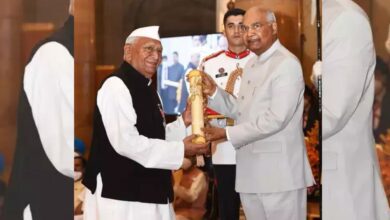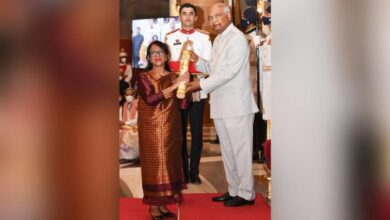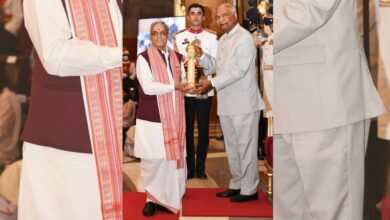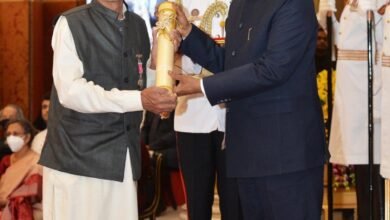
Sakini Ramachandraih
Ramachandraiah received the Padma Shri award from the Indian government, the third-highest honor in the Padma series of honors, in recognition of his outstanding contributions to the arts. His work as a “Koya tribal singer from Bhadradri – among the last preserving the historic practice of reciting the Koya tribe’s oral histories” is recognised by the prize.
Who is Sakini Ramachandraih ?

On January 1, 1963, Sakini Ramachandraih was born to the Koya tribe’s royal family, Musalayya-Gangamma, in Bhadradri, Kottagudem District, Manuguru Zone, Koonavaram, Telangana. He never had a formal education, and he is still illiterate now. But starting at age twelve, he began to exhibit a fondness for the Dhol playing technique, which he most likely acquired from his grandfather.
Ramachandraih has memorised a sizable number of the songs that the Koya tribal artists have a long heritage of passing down orally to younger generations. Stories of tribal warriors like Sammakka-Saralamma, Girikamaraju, Pagididda Raju, Ramaraju, Gadiraju, Bapanamma, Musalamma, Nagulamma, and Sadalamma are among the themes of these songs. They also contain family history and tales about the founding of tribes. The performers are crucial during celebrations and significant occasions like marriage days in Koya homes.
Ramachandraih practiced a form of art called “Kanchumelam-Kanchuthalam,” which is practically extinct. The history of the “Sammakka Sarakka Jathara” festival, also known as “Sammakka Saralamma Jatara” or “Medaram Jatara,” can only be fully narrated in Telugu and Koya by Ramachandraih, the only living practitioner of the art.
Ramachandraiah’s talent came to wider attention for the first time in 2014 when he narrated the history of Sammakka-Saralakka, two tribal women (mother and daughter) who fought against Kakatiya rulers in the 13th century. “It became an instant hit. He has also popularized other ballads such as Boponamma Katha, Godi Kama Roaju Katba, etc,” said Jayadheer Tirumala Rao, a retired professor of Telugu University, who has recorded and documented Ramachandraiah’s oral narratives.




